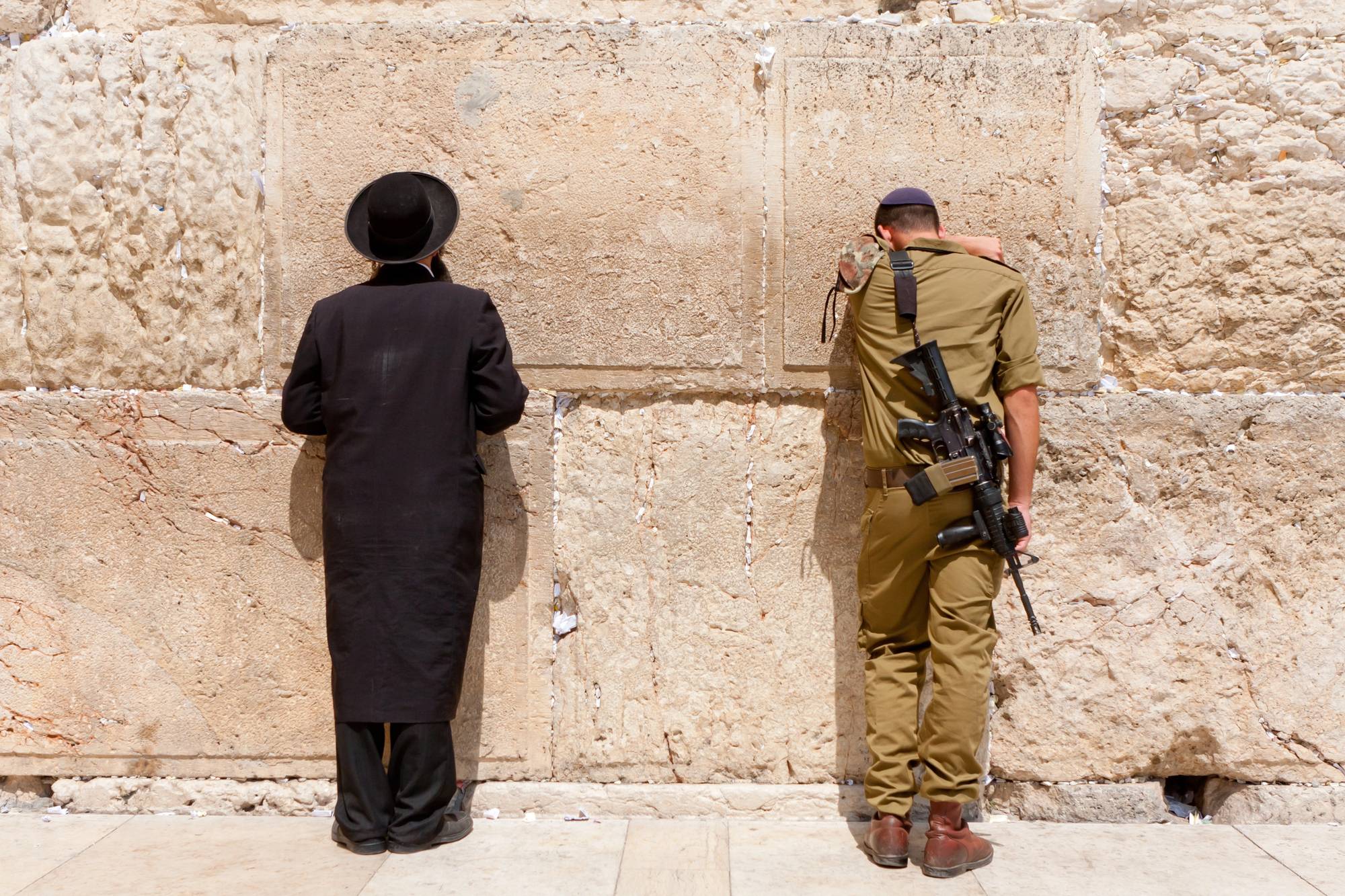It takes less than half an hour to walk between “Lishkat Giyus,” the Israeli army’s recruitment office in Jerusalem, and Yeshiva Mir, the largest Talmud school in the world with 9,000 students, and yet each seems to be the gateway to a world of its own and an invisible crater in between.
In Israel, Chilonim, Dati-Leumi and Charedim live in very close proximity to each other, and the debate over military service for yeshiva students from the Haredi sector has been one of the greatest strains on the already complicated symbiosis between the different sectors of the Jewish people in Israel for decades.
Since the establishment of the Jewish state in 1948, Israel has been in either an active or passive state of war, and is therefore dependent on a manned and highly trained army. Israel has compulsory military service and, according to the CIA, there are approximately 170,000 men and women on active duty and approximately 500,000 reservists.
For Jewish men and Druze, the three-year military service is compulsory, while other minorities such as the Negev Bedouins and Arab Israelis can volunteer for service.
From the beginning, however, there were exceptions. Two months before the establishment of the state, in March 1948, Yisrael Galili, Commander-in-Chief of the Defense Forces, announced that yeshiva students would be temporarily exempted from military service.
In 1951, Prime Minister David Ben-Gurion wrote for the first time in an official letter to the Ministry of Defense and the Chief of the General Staff:
“On the basis of Article 12 of the Defense Service Law, I have exempted yeshiva students from military service. If yeshiva students are found outside their place of study, even if they are on a mission, the military police must arrest these students”.
This decision was based on an agreement between the Israeli government and Agudat Yisrael, the political representation of Orthodox Jews under the leadership of Yitzhak-Meir Levin (1893-1971), and was aimed at consolidating a secular-religious status quo. This refers to David Ben-Gurion’s efforts to ensure the cooperation and peaceful coexistence of polarized population groups in a confined space by agreeing on basic Jewish values, despite the secular constitution and culture of the future state.
This agreement was officially introduced in the following years under the term “Toraso Umanuso” (literally: Torah as the main occupation) and applied for decades.
With the rapid growth of Israel’s population and the resulting increase in the number of yeshiva students exempted from military service, dissatisfaction grew on a political and social level. Whereas in Ben-Gurion’s time there were 400 yeshiva students, by the turn of the century there were tens of thousands.
In addition, the Israeli Supreme Court ruled in 1998 that the Israeli Ministry of Defense (then represented by Prime Minister David Ben-Gurion) did not have the authority to decide on the exemption of orthodox yeshiva students from military service, and called on the Israeli government to address the issue.
On August 22, 1999, the “Tal Committee” was established, named after former Head of Supreme Court Tzvi Tal, and convened by then Prime Minister Ehud Barak. This committee was to propose to the government a solution to the political and social dilemma. In the same year, “Netzach Yehuda” (formerly “HaNachal HaCharedi”), a battalion for Orthodox Jews, was established. The battalion initially consisted of only 30 soldiers, but at its peak (2012) it was the largest battalion in the IDF with 700 soldiers. Since 2005, “Netzach Yehuda” has been part of the Kfir Brigade.
In 2002, the committee submitted its proposal to the government, which voted 51 to 41 in favor of the “Law on Deferral of Military Service for Yeshiva Students“, also known as the “Tal Law”. According to the law, yeshiva students up to the age of 22 can defer their military service for one year each year if they can prove that they devote at least 45 hours a week to Torah study alone. After that, they are given a “decision year” to choose between 16 months of army service or 12 months of unpaid civilian service (if they no longer meet the criteria for exemption).
In 2006, the Supreme Court ruled that the “Tal Law” was legally problematic and that the proportion of yeshiva students in the army had not changed. In 2012, the Supreme Court finally ruled that the Tal Law violated the Israeli law and asked the government again to find a solution.
In a dramatic announcement on June 24, 2024, the Supreme Court announced that there could be no exemption for yeshiva students and that the IDF should begin recruiting them.
Among the Orthodox rabbis, there were different attitudes to the Tal Law from the beginning. While many prominent rabbis and roshei yeshiva, including Rav Aharon Leib Steinman and Rav Yosef Shalom Elyashiv, supported the Tal Law, there were also voices, including Rav Moshe Shmuel Shapiro, one of the most prominent roshei yeshiva, who continued to demand the unconditional exemption for yeshiva students. The latter demonstratively left the “Moetzes Gedolei HaTora” because he did not agree with its consensus.
But why should yeshiva students be exempted from military service? At first glance, the outcry for equality seems justified.
Since the Exodus from Egypt, the Jewish people have had an army. The Torah tells how they were attacked by Amalek in the desert and were only able to defeat this fierce enemy through the prayers of Moshe (see Rashi).
According to the Midrash, during the later wars, the soldiers also received spiritual support in the form of prayer and Torah study while wandering in the desert.
Thus, the Midrash (Bamidbar Rabbah ch. 22:2) interprets the verse in the Book of Bamidbar (ch. 31, verses 3-6) as follows: Hashem commanded Moshe to raise an army for the war against Midyan and, in addition to 12,000 soldiers (1,000 from each tribe), to recruit another 12,000 “soldiers” whose task it was to pray for the success of the soldiers.
Rav Pesach Zvi Frank (1873-1960), Gaavad of Jerusalem, said during the War of Independence in Israel, based on the Gemora in Makkos 10a:
“Anyone who devotes himself entirely to the study of Torah is a soldier in Hashem army in defense of the Jewish people, and the soldiers who face the enemy at the front are protected by the merit of Torah students.”
The Jewish people differ from other peoples in that they are under the supernatural leadership of Hashem. Victory is only possible if tefilos are said for the safety and success of the soldiers on the battlefield.
Furthermore, various passages in the Gemora indicate that it is even forbidden to enlist talmidei chachamin in the army:
Rav Avraham Yitzchak Kook (1865-1935), the first Ashkenazi Chief Rabbi of British Mandate Palestine, was Rov of the “Machzikei HaDaas” in London during World War I and sacrificed his life to exempting yeshiva students from British military service.
In a letter to the Chief Rabbi of the United Kingdom, Rabbi Dr. Joseph Herz (1872-1946), he argued, citing numerous sources, that the talmidei chachamim must be exempted from military service and called on Rabbi Herz to do more to achieve this.
He quotes the Gemora (Sota 10a), according to which the Judean king Asa was punished because he had recruited talmidei chachamim. According to one opinion in the Nedorim (32a), Avrohom Avinu was also punished because he took Talmidei Chachamim with him to war. Rabbi Kook explicitly writes that there is no difference between a Milchemes mitzvah (defensive war) and a Milchemes Reshus (offensive war).
However, it must be emphasized that the talmidei chachamim, whose Tefilos and Torah study protect their brethren on the front, are expected and required to devote themselves entirely to Torah study day and night in order to fulfill their duty to the Jewish people.
However, this only applies if the army has enough soldiers and the exemption of the talmidei chachamim does not lead to increased danger for the soldiers. Otherwise, the Zitz Eliezer, Rav Eliezer Waldenberg (1915-2006), is convinced based on the Rambam (Hilchos Shabbos 2:23), that everyone must do their part, as pikuach nefesh has top priority in Judaism (“Hilchos Medinah” Vol. 3, Siman 9, para. 1).
Another argument of Orthodox yeshiva students against serving in the IDF is that the army is not able to provide an appropriate environment and atmosphere from an orthodox perspective and that their spiritual level suffers as a result. Some would even claim that Orthodox soldiers are deliberately secularized. In any case, there are studies that say that one-fifth of dati-leumi soldiers abandon their religious lifestyle after military service.
While the Talmudic sources may be interpreted differently, according to which there is no halachic exemption for yeshiva students in the current situation, the latter argument remains the main reason for many Orthodox Jews to oppose military service in the IDF.
This debate has been going on for decades, and the gap between the camps grows wider every year. An end to the debate is not expected in the foreseeable future.
We hope and pray that the day will come when Lishkat Giyus is no longer necessary and the Jewish people can live in peace in the Holy Land. But perhaps before then, we will succeed in building a bridge that spans the crater between the Lishkat Giyus in Jerusalem and Yeshivat Mir, and we will understand that all these years the Jewish people have fought side by side, each in their own way.




